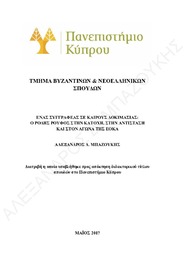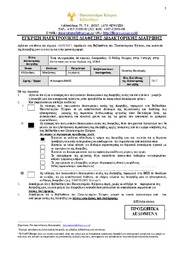| dc.contributor.advisor | Βουτουρής, Παντελής | el |
| dc.contributor.author | Μπαζούκης, Αλέξανδρος Δ. | el |
| dc.coverage.spatial | Κύπρος | el |
| dc.coverage.spatial | Cyprus | en |
| dc.creator | Μπαζούκης, Αλέξανδρος Δ. | el |
| dc.date.accessioned | 2017-05-22T13:38:09Z | |
| dc.date.accessioned | 2017-07-28T09:25:11Z | |
| dc.date.available | 2017-05-22T13:38:09Z | |
| dc.date.available | 2017-07-28T09:25:11Z | |
| dc.date.issued | 2017-05 | |
| dc.date.submitted | 2017-05-10 | |
| dc.identifier.uri | https://gnosis.library.ucy.ac.cy/handle/7/38938 | en |
| dc.description | Περιέχει βιβλιογραφία (σ. 701-733). | el |
| dc.description | Αριθμός δεδηλωμένων πηγών στη βιβλιογραφία: 340 | el |
| dc.description | Διατριβή (Διδακτορική) -- Πανεπιστήμιο Κύπρου, Φιλοσοφική Σχολή, Τμήμα Βυζαντινών και Νεοελληνικών Σπουδών, 2017. | el |
| dc.description | Η βιβλιοθήκη διαθέτει αντίτυπο της διατριβής σε έντυπη μορφή. | el |
| dc.description.abstract | Η παρούσα εργασία, στο πρώτο της μέρος (κεφ. 1-3), είχε ως αντικείμενό της την παρουσίαση, για πρώτη φορά εξαντλητικά και εκ του σύνεγγυς, όλων των τοποθετήσεων της ελλαδικής και κυπριακής κριτικής για την κατοχική/αντιστασιακή τριλογία του Ρόδη Ρούφου με τον γενικότερο τίτλο Χρονικό Μιας Σταυροφορίας [Η Ρίζα του Μύθου (1954), Πορεία στο Σκοτάδι (1955), Η Άλλη Όχθη (1958), και σε δεύτερη, βελτιωμένη και συγκεντρωτική σε έναν τόμο έκδοση το 1972] και για τη Χάλκινη Εποχή (1960) ‒στην περίπτωση του «μυθιστορήματος του Κυπριακού Αγώνα» παρουσιάστηκε επιπλέον η δεξίωση της προγενέστερης έκδοσης της Age of Bronze (1960) από τη βρετανική κριτική. Παράλληλα, τα πρώτα τρία κεφάλαια παρείχαν την αφορμή για έναν αναστοχασμό γύρω από τις (ιστορικές/πολιτικές) συνθήκες, τις (θεωρητικές) προϋποθέσεις και τις (συλλογικές) «(ανα)παραστάσεις», αλλά και πάνω στις (αναπόφευκτες) ελλείψεις, αποσιωπήσεις ή/και αγκυλώσεις του κριτικού λόγου της πρώτης μεταπολεμικής περιόδου.
Από την άποψη αυτή, ο Ρούφος (με τα συγκεκριμένα μυθιστορήματά του) προβλήθηκε ως ένας από τους πιο αντιπροσωπευτικούς «δείκτες» για τη στάθμη, την εγκυρότητα και την ποιότητα της μεταπολεμικής ελλαδικής (και κυπριακής) λογοτεχνικής κριτικής. Ταυτόχρονα, το έργο του έδωσε την ευκαιρία να γίνουν αντιληπτές η απήχηση που είχαν τα γεγονότα της «συνταρακτικής» δεκαετίας του 1940 πάνω στη διανόηση της εποχής, καθώς και η διάθλασή τους στις συνειδήσεις διαφόρων λογίων και συγγραφέων. Κατά τούτο, δόθηκε έμφαση στους λόγους/discourses/ discours (με τη μπαχτινική έννοια του όρου) που διαμορφώθηκαν, αρθρώθηκαν και διασταυρώθηκαν στη δεδομένη και «εύθραυστη» συγκυρία της δεκαετίας του 1950 ‒η οποία, βέβαια, συνέπεσε και με την πρώτη κορύφωση του Κυπριακού Προβλήματος και τον Αγώνα της ΕΟΚΑ, ανακαλώντας μνήμες (και ενοχές) ενός απωθημένου, πλην τόσο πρόσφατου (τότε), παρελθόντος.
Ακολούθως, ο «διάλογος» με το έργο του συγγραφέα και με τις κριτικές τοποθετήσεις ομοτέχνων και λογίων της εποχής του, αλλά και με αντίστοιχες προσεγγίσεις (ακαδημαϊκών και μη) φιλολόγων και ιστορικών έως και σήμερα, οδήγησε σε μια νέα ερμηνευτική πρόταση για τα πλέον αμφιλεγόμενα και «στρατευμένα» βιβλία του συγγραφέα, τη Ρίζα του Μύθου και τη Χάλκινη Εποχή. Στο τέταρτο κεφάλαιο συζητήθηκαν όλα τα «κενά», οι ασυνέπειες, οι ιδεολογικές και αισθητικές παλινδρομήσεις του αυτοβιογραφικού ήρωα ‒με άλλα λόγια, όλες οι προβληματικές πτυχές που είχαν εντοπιστεί εξαρχής στον πρώτο τόμο της τριλογίας και οδήγησαν εν πολλοίς τον συγγραφέα σε διορθωτικές επεμβάσεις στην αναθεωρημένη και οριστική έκδοση του Χρονικού μιας Σταυροφορίας μέσα στην απριλιανή δικτατορία. Όσο για τη Χάλκινη Εποχή, στην οποία επικεντρώθηκε το πέμπτο κεφάλαιο, στόχος ήταν να διαφανεί η συνέχεια της πορείας του Δίωνα και του Αλέξη (ενός αυτοβιογραφικού, αγωνιστικού και συγγραφικού, «διδύμου» πρώην «σταυροφόρων»), από την Αθήνα, τα βουνά της Ηπείρου και την Κέρκυρα της δεκαετίας του 1940, στο νησί της αγγλοκρατούμενης Κύπρου στη δεκαετία του 1950, στα χρόνια δηλαδή της προετοιμασίας και της διεξαγωγής ενός άλλου Αγώνα ‒ενάντια, μάλιστα, στους «φίλους του άλλου πολέμου».
Στην κατεύθυνση της διερεύνησης των ζητημάτων αυτών, στην επιβεβλημένη απόπειρα εξοικείωσης με τον «ιστορικό ορίζοντα» του Χρονικού μιας Σταυροφορίας, της Χάλκινης Εποχής και του δημιουργού τους, αλλά και στη διακρίβωση και στον προσδιορισμό της συμμετοχής και του ρόλου του ίδιου του Ρούφου (και των οργανώσεων όπου εντάχθηκε) στο αντιστασιακό κίνημα στην πρωτεύουσα και στα βουνά της Ηπείρου ή, αργότερα, στον Απελευθερωτικό Αγώνα του 1955-59 –εμπειρίες που αποτέλεσαν την πρώτη ύλη των βιβλίων του και βρήκαν εκεί τη λογοτεχνική τους μετουσίωση–, πολύτιμη στάθηκε η συνδρομή άλλων μαρτυριών και, φυσικά, συναφών ιστορικών μελετών και έργων. Την ίδια στιγμή, και με δεδομένο ότι η όποια «πραγματικότητα» στα έργα μυθοπλασίας δεν μπορεί παρά να υπακούει ή να υποτάσσεται (και) στις αισθητικές αναγκαιότητες που ένα συγκεκριμένο λογοτεχνικό είδος επιβάλλει, τα υπό εξέταση βιβλία του Ρούφου ειδώθηκαν υπό το πρίσμα μιας ιδιότυπης μίξης επικαιρικού (documentary), αυτοβιογραφικού, ιδεολογικού και εφηβικού μυθιστορήματος. | el |
| dc.description.abstract | In the first part of the thesis (chapters 1-3), the Greek and Cypriot critical book reviews of Rodis Roufos’s are given close scrutiny and analysis for the first time. These reviews examine Roufos’ Chronicle of a Crusade, [The Root of Myth (1954), Course in Darkness (1955), The Other Bank (1958), published also in a second, revised, collective and one-volume edition as Chronicle of a Crusade (1972)], and of The Age of Bronze (1960). Furthermore, the first part of the thesis looks into the case of ‘the novel of the Cypriot Struggle’ and the reception of the first, English version of The Age of Bronze by British criticism. At the same time, the first part reflects on the (historical/political) conditions, the (theoretical) requirements and the (collective) ‘re-presentations’ of the critical discourse in the first post-war period, but also on its (inevitable) shortcomings, and/or the inflexibility.
From this point of view, reaction to Roufos (and to these novels, in particular) is presented as one of the most representative ‘indicators’ of the level, validity and quality of post-war Greek (and Cypriot) literary criticism. At the same time, Roufos’ work gives us the opportunity to perceive the impact of the events of the ‘dramatic’ decade of 1940 on the intellectuals of the time, as well as its refraction in the consciences of various scholars and authors. In this respect, emphasis is given to the ‘discourses’/discours (in the sense of Bakhtin’s terminology) that were formed, articulated and intersected in the given and ‘fragile’ juncture of the 1950s ‒which, of course, coincided with the first peak of the Cyprus Problem and with the EOKA Struggle, recalling memories (and guilt) of a repressed, yet a then recent, past.
The ‘dialogue’ with the author’s work and with the critical attitudes of his colleagues and scholars of his time, as well as with similar approaches (academic and non-scholarly) of historians to this day, lead to a new interpretative proposal for the most controversial and ‘militant’ books by Roufos, namely The Root of Myth and The Age of Bronze. In the fourth chapter of the thesis, all the ‘gaps’, inconsistencies, ideological and aesthetical regressions of the autobiographical hero are discussed ‒in other words, all the problematic aspects that are identified from the outset in the first volume of the trilogy, and that largely led the author to corrective interventions in the revised and definitive version of the Chronicle of a Crusade during the dictatorship of 1967-1974.
As for The Age of Bronze, which is examined in the fifth chapter, the aim of the thesis is to show the continuation of the course of Dion and Alexis (that is the autobiographical ‘twin’ of former ‘crusaders’, both fighters and writers), from Athens, through the mountains of Epirus and Corfu in the 1940s, to the colonial Cyprus of the 1950s, during the years of preparation and conduct of another Liberation Struggle ‒this time, against the ‘friends of the other war’.
In the direction of exploring these issues, the needed endeavor to familiarize ourselves with the ‘historical horizon’ of the Chronicle of a Crusade, of The Age of Bronze and of their creator is undertaken. On top of this, the role of Roufos himself (and of the several Organizations in which he joined) to the Resistance in the Greek capital (and on the mountains of Epirus) and, later on, to the Liberation Struggle of 1955-59 in Cyprus is identified ‒ given that these experiences constitute the raw material of his work in which it found its literary denaturation. This endeavor has been accomplished with the invaluable aid of witnesses and, of course, of relevant historical studies and projects. At the same time, and given that any ‘reality’ in the fictional works can only obey (being subordinated) to the aesthetic necessities imposed by a particular literary genre, the books under discussion were also examined in the light of a peculiar mixture of documentary, autobiographical, ideological and adolescent novel. | en |
| dc.format.extent | 733 σ. ; 30 εκ. | el |
| dc.language.iso | gre | en |
| dc.publisher | Πανεπιστήμιο Κύπρου, Φιλοσοφική Σχολή / University of Cyprus, Faculty of Letters | |
| dc.rights | info:eu-repo/semantics/openAccess | en |
| dc.rights | Open Access | en |
| dc.subject.lcsh | Ρούφος,Ρόδης, 1924-1972 -- Κριτική και ερμηνεία | el |
| dc.subject.lcsh | Ρούφος,Ρόδης, 1924-1972 Χρονικό μιας σταυροφορίας | el |
| dc.subject.lcsh | Ρούφος,Ρόδης, 1924-1972 Η ρίζα του μύθου | el |
| dc.subject.lcsh | Politics and literature -- Greece -- History -- 20th century | en |
| dc.subject.lcsh | Politics and literature -- Cyprus -- History -- 20th century | en |
| dc.subject.lcsh | Greek literature, Modern -- History and criticism | en |
| dc.subject.lcsh | Greek literature, Modern -- Cyprus -- History and criticism | en |
| dc.title | Ένας συγγραφέας σε καιρούς δοκιμασίας : ο Ρόδης Ρούφος στην Κατοχή, στην Αντίσταση και στον αγώνα της Ε.Ο.Κ.Α. | el |
| dc.title.alternative | An author in times of tribulation: Rodis Roufos and his novels on the Occupation, the Resistance and the Struggle of EOKA | en |
| dc.type | info:eu-repo/semantics/doctoralThesis | en |
| dc.contributor.committeemember | Βουτουρής, Παντελής | el |
| dc.contributor.committeemember | Αμπατζοπούλου, Φραγκίσκη | el |
| dc.contributor.committeemember | Καραπιδάκης, Νίκος | el |
| dc.contributor.committeemember | Πουργούρης Μαρίνος | el |
| dc.contributor.committeemember | Αθανασοπούλου, Αφροδίτη | el |
| dc.contributor.committeemember | Voutouris, Pantelis | en |
| dc.contributor.committeemember | Ampatzopoulou, Fragkiski | en |
| dc.contributor.committeemember | Karapidakis, Nikos | en |
| dc.contributor.committeemember | Pourgouris, Marinos | en |
| dc.contributor.committeemember | Athanasopoulou, Afroditi | en |
| dc.contributor.department | Πανεπιστήμιο Κύπρου, Φιλοσοφική Σχολή, Τμήμα Βυζαντινών και Νεοελληνικών Σπουδών | el |
| dc.contributor.department | University of Cyprus, Faculty of Letters, Department of Byzantine and Modern Greek Studies | en |
| dc.subject.uncontrolledterm | ΡΟΔΗΣ ΡΟΥΦΟΣ (1924-1972), ΖΩΗ, ΔΡΑΣΗ, ΕΡΓΟ | el |
| dc.subject.uncontrolledterm | ΝΕΟΕΛΛΗΝΙΚΗ ΛΟΓΟΤΕΧΝΙΑ ΚΑΙ ΚΑΤΟΧΗ-ΑΝΤΙΣΤΑΣΗ-ΕΜΦΥΛΙΟΣ (1941-1944) | el |
| dc.subject.uncontrolledterm | ΝΕΟΕΛΛΗΝΙΚΗ ΛΟΓΟΤΕΧΝΙΑ ΚΑΙ ΑΠΕΛΕΥΘΕΡΩΤΙΚΟΣ ΑΓΩΝΑΣ ΕΟΚΑ (1955-1959) | el |
| dc.subject.uncontrolledterm | ΝΕΟΕΛΛΗΝΙΚΗ ΚΡΙΤΙΚΗ-ΠΡΩΤΗ ΜΕΤΑΠΟΛΕΜΙΚΗ ΠΕΡΙΟΔΟΣ | el |
| dc.subject.uncontrolledterm | ΜΥΘΙΣΤΟΡΗΜΑ/ΕΙΔΗ/ΘΕΩΡΙΑ : ΕΦΗΒΕΙΑΣ, ΧΡΟΝΙΚΟ, ΑΥΤΟΒΙΟΓΡΑΦΙΚΟ, ΙΔΕΟΛΟΓΙΚΟ | el |
| dc.subject.uncontrolledterm | ΧΡΟΝΙΚΟ ΜΙΑΣ ΣΤΑΥΡΟΦΟΡΙΑΣ (1972/ ΡΙΖΑ ΤΟΥ ΜΥΘΟΥ, ΠΟΡΕΙΑ ΣΤΟ ΣΚΟΤΑΔΙ, ΑΛΛΗ ΟΧΘΗ) | el |
| dc.subject.uncontrolledterm | ΧΑΛΚΙΝΗ ΕΠΟΧΗ (ΤΟ ΜΥΘΙΣΤΟΡΗΜΑ ΤΟΥ ΚΥΠΡΙΑΚΟΥ ΑΓΩΝΑ)-1960 | el |
| dc.subject.uncontrolledterm | ΜΕΤΑΠΟΛΕΜΙΚΗ ΛΟΓΟΤΕΧΝΙΑ/ΚΡΙΤΙΚΗ KAI ΙΔΕΟΛΟΓΙΑ ΣΤΗ ΔΕΚΑΕΤΙΑ ΤΟΥ 1950 | el |
| dc.subject.uncontrolledterm | RODIS ROUFOS (1924-1972), LIFE, PUBLIC ACTION, WORKS | en |
| dc.subject.uncontrolledterm | MODERN GREEK LITERATURE AND OCCUPATION-RESISTANCE-CIVIL WAR | en |
| dc.subject.uncontrolledterm | MODERN GREEK LITERATURE AND LIBERATION STRUGGLE OF EOKA (1955-1959) | en |
| dc.subject.uncontrolledterm | MODERN GREEK CRITICISM AND FIRST POST WAR PERIOD | en |
| dc.subject.uncontrolledterm | THEORY OF NOVEL-GENRES: BILDUNGSROMAN, DOCUMENTARY, AUTOBIOGRAPHICAL, IDEOLOGICAL | en |
| dc.subject.uncontrolledterm | CHRONICLE OF A CRUSADE (1972/ ROOT OF THE MYTH, COURSE IN DARKNESS, THE OTHER BANK) | en |
| dc.subject.uncontrolledterm | THE AGE OF BRONZE (1960) | en |
| dc.subject.uncontrolledterm | MODERN GREEK POST WAR LITERATURE/CRITICISM AND IDEOLOGY DURING THE 1950’S | en |
| dc.identifier.lc | PA5628.Ο88Ω76 2017 | en |
| dc.author.faculty | Φιλοσοφική Σχολή / Faculty of Letters | |
| dc.author.department | Tμήμα Βυζαντινών και Νεοελληνικών Σπουδών / Department of Byzantine and Modern Greek Studies | |
| dc.type.uhtype | Doctoral Thesis | en |
| dc.rights.embargodate | 2020-05-10 | |


